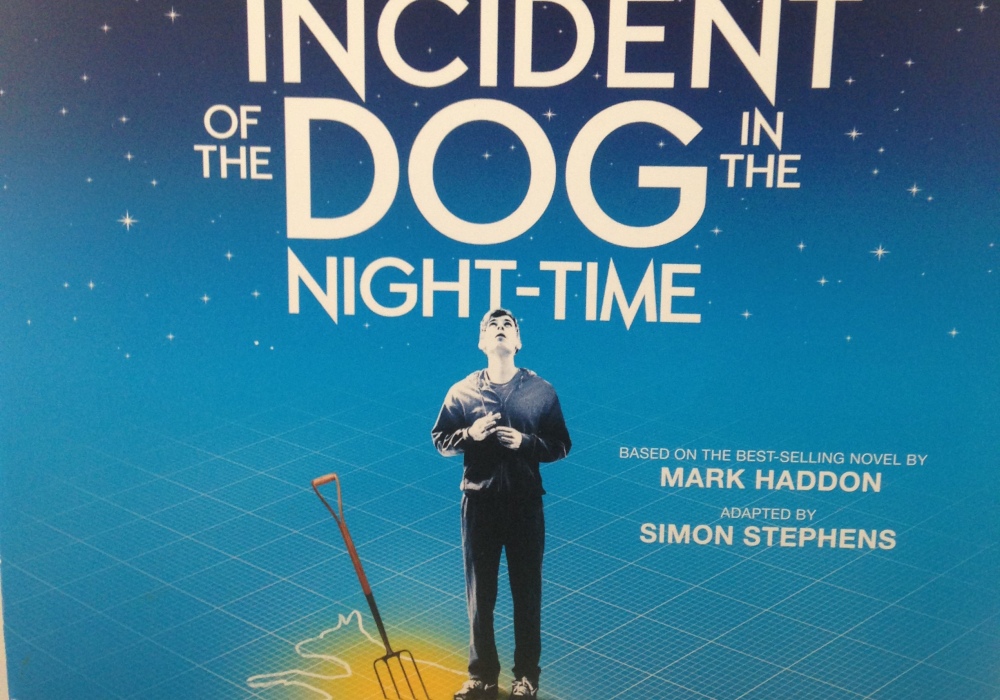I made it to the theatre with 4% battery left on my phone, which was enough to turn it on to show my confirmation receipt to pick up my ticket from will call. I found my ticket the night before from a site called The Box Office for £17.50! The usher guided me to my seat, which led to the discovery that I was in the front row! Sometimes that’s not the best thing for a play because you can miss certain sights, but that wasn’t the case for this show.
The Curious Incident of the Dog in the Night-Time is about a 15-year-old with Aspergers who becomes a detective after his neighbor’s dog was found dead with a garden pitchfork in its side. Through this detective work, he uncovers other mysteries. In addition to all of that, we cheer him on as he is the youngest person in his school to ever take the highest level exams, furthering his goal of becoming an astronaut.
This show is a great tool to teach about the mind of a person with Asperger Syndrome. There were multiple instances where the lighting, sound, and other sensory elements were heightened to bring us into Christopher’s world. Additionally, the story is presented as a book he has written, so it is very much through his perspective. Because he has a mathematical brain, the set was nonexistent; rather, the walls, ceiling, and floor were coordinates. Sometimes words and patterns would light up to coincide with the action on stage. It also doubled as a chalk board, so Christopher could diagram what he was discussing. If there were any props needed, they came out of hidden drawers inside of the walls. It was truly fascinating to watch.
Though I think the big takeaway from The Curious Incident is a more thorough understanding of Aspergers, as the author of the novel noted in his address in the playbill (once again, not free), was that the play is “about many other things as well: mathematics, families, space, death, loyalty, maps, Sherlock Holmes, truth, bravery, Swindon, railways….” Personally, I think it was an interesting look at how a story could be presented. Truly, if a story were told not just through the perspective of someone, but through all of the tangents of the mind and the attitude towards things, those of us who are considered “normal” would very well seem “disabled” as well. The mind is a curious thing, and we all process the world differently.
Anyway, after the curtain call, Christopher made a return to stage to explain how he solved the question that was part of his exam. It was very exciting, as all of the technical elements possible were employed, complete with confetti at the end.
After I gathered up some confetti to keep as a souvenir, I chatted with the usher who sold me my program to find out where the stage door is. Though I wasn’t previously familiar with any of the actors in the show, I wanted to let them know I appreciated their work. I greeted some actors as they left, and they were all polite as I congratulated them on a job well done. At first I thought I was the only audience member who bothered to meet the actors, and then I noticed a teenage boy.
I asked him if he was also waiting to meet the actors, and he said he was kind of friends with them. He then opened up, saying this was his third time seeing the show. He has Aspergers himself, and his therapist lent him the novel. He said he read it, but then returned it and bought his own, declaring, “books are like friends, and you don’t just borrow your friends – you keep them.” He showed me his own copy of his book, and was proud to point out all of the signatures from the cast and his loved ones, all with encouraging words to follow his own dreams.
At last, the actor who played Christopher emerged and he immediately recognized the young man. They caught up for a bit, and I distanced myself because I didn’t want to intrude. I did overhear, however, that he thanked the actor because this show has been his safety blanket when he’s sad, and it’s given him courage. He hadn’t forgotten I was there, though, because he paused his conversation so I, too, could talk to the actor. I kept it brief, but was so thankful that I was able to see that interaction. (By the way, the young man was wearing an outfit identical to the character Christopher, which was just so neat.)
In one of the scenes in the show, Christopher has to find his way from Swindon to London all on his own. He doesn’t really know the way, but he manages to figure out the buses and trains. I had a dead phone, and a napkin with a few directions scribbled on it, but the story also inspired me that I would make it. It was a bit of an adventure, but I was surprised to find it wasn’t as hard as I thought to find my way back. Sometimes it’s nice to have a reminder that we can, in fact, survive without phones.

Hi Samantha, I am enjoying your blog. They are fun to read. I will continue to follow it.
LikeLike
Thank you! I’m glad you’re enjoying it 🙂
LikeLike